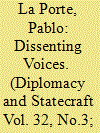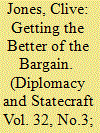|
|
|
Sort Order |
|
|
|
Items / Page
|
|
|
|
|
|
|
| Srl | Item |
| 1 |
ID:
181025


|
|
|
|
|
| Summary/Abstract |
In the Cold War, South Africa saw itself an important stronghold of the West, being also Britain’s fourth largest export market. Edward Heath’s Conservative government assumed that Pretoria would participate in the region’s defence, thus resumption of arms supplies for external defence was necessary, while African countries could not ignore their economic dependence on the White regime. On the other hand, Black Africa perceived South Africa as a danger to international stability. Kenneth Kaunda, Zambia’s president, warned that Western Powers' failure to ‘assist the oppressed’ was forcing nationalists into the communist bloc, while Julius Nyerere of Tanzania wrote that outside forces were oppressing Africans. The freedom struggle had become part of the global ideological conflict. For Britain, it remained part of Cold War issues and balance of payments questions; for Africans, it was something non-negotiable. Nonetheless, Western regional security favoured a flourishing arms market from which no one wanted exclusion.
|
|
|
|
|
|
|
|
|
|
|
|
|
|
|
|
| 2 |
ID:
181022


|
|
|
|
|
| Summary/Abstract |
This analysis evaluates plans for President Dwight Eisenhower’s visit to the Soviet Union in June 1960, prior to Soviet leader Nikita Khrushchev revoking his invitation at the Paris summit a month before. The plans were at an advanced stage prior to cancellation. The aborted trip is a footnote in the scholarship, but reconstructing the plans allows understanding the trip as part of the wider context of American diplomacy in 1960 and reveals its purpose in a new depth. Whilst the trip would not have been a critical juncture in the Cold War, understanding it informs appraisals of the final year of Eisenhower’s presidency. It provides insights into two questions of relevance for Eisenhower scholarship: What was the trip’s purpose? How would it have fitted into Eisenhower’s wider diplomatic plans in 1960?
|
|
|
|
|
|
|
|
|
|
|
|
|
|
|
|
| 3 |
ID:
181019


|
|
|
|
|
| Summary/Abstract |
This analysis explores the criticism about the creation of mandates in the League of Nations, particularly in the Secretariat; there, a number of officials questioned the organisation’s stance on this matter. Their critical views showed the crucial importance of the early debates in shaping the League’s nature and revealed the existence of a core group of eminent Secretariat members whose beliefs objected to the principles underlying the draft mandate provisions and the League’s tacit assent in their approval. These opinions highlighted administrative shortcomings in the League’s structure, particularly the Secretariat’s role and the ambiguous attitude of the secretary general, and foresaw the detrimental consequences that the mandates system would have for the League’s reputation. Some Secretariat members, who envisaged a more assertive role for the institution, vigorously challenged views on the League’s helplessness in the international post-war context that have come to predominate in current scholarship.
|
|
|
|
|
|
|
|
|
|
|
|
|
|
|
|
| 4 |
ID:
181023


|
|
|
|
|
| Summary/Abstract |
This analysis explores the nature of Anglo-Israeli intelligence relations between 1967 and 1974, focusing in particular on how the legacy of the British mandate in Palestine, the influence of senior British diplomats, as well as wider commercial interests shaped attempts by intelligence officials on both sides to move this relationship beyond the purely functional. Whilst Israel looked to barter access to recently captured Soviet equipment for greater collaboration with the British in weapons development and arms sales, London demurred. Despite the urging of some in Whitehall, the Foreign and Commonwealth Office limited any collaboration to functional exchanges and kept them firmly in the shadows. The aftermath of the October 1973 war revealed the price paid by Britain. With Israel now dependent on Washington for the bulk of its military equipment, London’s ability to exercise any influence over Tel Aviv in reaching an accommodation with its Arab neighbours diminished greatly.
|
|
|
|
|
|
|
|
|
|
|
|
|
|
|
|
| 5 |
ID:
181018


|
|
|
|
|
| Summary/Abstract |
Over the past several years, there has been a renewed scholarly interest in the origins, waging, and consequences of the First World War. This interest has resulted partly from a quirk of timing given that between 2014 and 2019, a series of centennial commemorations kept minds focused on a conflict that many take as the most consequential war the world ever experienced. On the other hand, interest has been stimulated not so much by the past as by the future of international security, with the “return” of the prospect of Great Power war beginning to concentrate minds in ways not experienced for a generation. Since much – but not all – of this renewed interest in Great Power war relates to China’s “rise” assessed through the prism of “power-transition theory”, it is natural to analogise from the events that led to 1914. In this, at least one interesting question remains relatively unexplored: are decisions to join a war already in progress prompted by a different calculus from decisions to go to war at the outset? In particular, does “status anxiety” warrant more attention as a determinant of policy-making than it has heretofore received on the part of late entrants? This analysis argues that it does and makes the case by analysing the decision of one latecomer, Italy, to join the First World War in April 1915. Although the chief focus is on Italy, the conclusion raises the possibility that status anxiety may also have been of importance in the American decision to go to war two Aprils later.
|
|
|
|
|
|
|
|
|
|
|
|
|
|
|
|
| 6 |
ID:
181020


|
|
|
|
|
| Summary/Abstract |
The German government decided to remilitarise the Rhineland on 7 March 1936, which meant violating the treaties of Versailles and Locarno. Existing literature says much about negotiations that started in spring 1936 on the so-called Western pact – sometimes called the ‘new Locarno’. However, these studies do not focus on the western Powers’ policies. The attitude of the Polish government was also important because Poland was an important French ally in East-Central Europe. This analysis explores whether Polish diplomacy tried to be active in negotiations concerning the Western pact. What were strategic Polish aims in connexion with a ‘new Locarno?’ What were the tactics of Polish diplomacy? And, finally, what did Warsaw achieve during the negotiations that started in March 1936? The answers to these questions determined Warsaw’s role in the failure of the Western pact negotiations.
|
|
|
|
|
|
|
|
|
|
|
|
|
|
|
|
| 7 |
ID:
181021


|
|
|
|
|
| Summary/Abstract |
This analysis explores the diplomacy regarding the possibility of sending British troops to the Soviet Union that took place between Soviet and British representatives during autumn and winter 1941. It demonstrates that despite retrospective emphasis on the absurdity of the proposal, both sides seriously considered the possibility of direct military help at the time, it played a far more important role in the development of Anglo-Soviet relations than previously acknowledged.
|
|
|
|
|
|
|
|
|
|
|
|
|
|
|
|
| 8 |
ID:
181024


|
|
|
|
|
| Summary/Abstract |
Claims about Soviet policy at the end of the October 1973 Arab-Israeli war played a key role in discrediting détente in the mid- and late 1970s. This analysis considers the part that Henry Kissinger played in triggering the Soviet actions at the end of the war to which the critics of détente pointed. Contrary to what Kissinger claimed, he essentially reneged on the agreement he had reached with the Soviet leadership to end the war and instead directly encouraged the Israelis to continue military operations well after the ceasefire was supposed to take effect. That, in turn, led to a crisis that had a profound effect on Soviet-American relations for years to come.
|
|
|
|
|
|
|
|
|
|
|
|
|
|
|
|
| 9 |
ID:
181026


|
|
|
|
|
| Summary/Abstract |
The Kosovo case remains topical for understanding the practice of state recognition, especially in the context of secessionist claims to independence. The diversity of reactions of third states to Kosovo’s declaration of independence finds basis on the gaps of international law that allow politics to play out in the practice of state-recognition. This analysis takes a closer look at arguments used by third states in their recognition practices related to Kosovo. It compares and contrasts the differing reactions to Kosovo’s claim to independence and deconstructs the politics of recognition with the help of Qualitative Content Analysis. This enquiry identifies ‘earned sovereignty’, ‘regional peace and stability’, and the ‘EU/NATO perspective’ as the main themes used for justifying Kosovo’s recognition. In essence, the practice of state recognition is both a legal and political act needing to be analysed in light of the political considerations of third states.
|
|
|
|
|
|
|
|
|
|
|
|
|
|
|
|
|
|
|
|
|